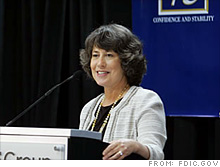Ally Bank bows to FDIC and cuts rates
The banking arm of troubled lender GMAC came under attack for offering above-market rates to savers. FDIC urged Ally to trim costs.
 |
| Regulators led by Sheila Bair have expressed concern about struggling banks paying high deposit rates. |
NEW YORK (Fortune) -- Ally Bank, a lending arm of struggling car-and-house financier GMAC, has cut the rates it offers depositors after a friendly chat with regulators.
The Utah-based bank trimmed the rate it offers on a one-year certificate of deposit to 2.49% from 2.8% in the past week.
The move came after the Federal Deposit Insurance Corp. sent Ally a letter reminding it of a commitment it made last month to reduce the cost of gathering deposits.
The bank's practice of offering above-market rates with the aid of federal funding -- GMAC has taken in some $21 billion in government capital and loan guarantees, and will soon list the government as its biggest shareholder -- recently drew the ire of the chief bank trade group, the American Bankers Association.
Ally Bank's total deposits rose 46% from a year ago in the first quarter, to $22.5 billion, as the bank offered certificate of deposit rates well above the national average.
The ABA urged the FDIC to crack down on what it deemed these "risky" deposit-gathering practices. The bankers questioned Ally's financial health, noting that it lost $133 million in the first quarter, while arguing that Ally's efforts to draw deposits endanger the health of the industry-funded FDIC deposit insurance fund.
Ally rejected those claims, claiming in a letter to the ABA that it was "better capitalized than many of your members." A spokeswoman for GMAC says the firm -- until 2006 a unit of General Motors (GMGMQ), and still the biggest provider of financing to GM and Chrysler customers -- has in its dealer network "an asset generation platform that enables us to put deposits to work profitably."
Ally's deposit-gathering and the surge of federal funding over the past six months are helping to keep GMAC afloat as it struggles with a souring mortgage portfolio and plunging car sales.
Still, the FDIC's letter to Ally suggests the agency shares the bankers' concerns about the deposit fund, which has fallen below its statutory minimum balance under the weight of five dozen bank failures since the start of 2008.
Last month, the FDIC issued rules capping the rates troubled banks can pay on deposits -- an edict that didn't apply to Ally Bank because it is well capitalized.
The letter requires Ally to report to the agency on its deposit rates and how they compare with other banks whenever it seeks to tap funds under a federal debt guarantee program.
"The FDIC is saying, show us what you're doing," ABA spokesman Wayne Abernathy said of the FDIC letter. "There's taxpayer money at risk here."
The FDIC's Temporary Liquidity Guarantee Program allows financial institutions to borrow, with FDIC backing, at near-Treasury rates in exchange for a fee. The FDIC approved GMAC last month to borrow $7.4 billion under the program. The company sold $4.5 billion of FDIC-backed bonds last week.
But before GMAC sells another round of bonds under TLGP, it will have to get the FDIC's prior written approval, the letter said. While that requirement isn't unheard of, it isn't a duty that all TLGP borrowers share.
Even with the recent reductions, Ally's rates are still well above the norm. The daily overnight average for a one-year CD Thursday was 2.07%, according to Bankrate.com.
"We monitor the market and adjust rates, as appropriate," the GMAC spokeswoman said. "Ally Bank intends to continue to offer customers rates that are among the most competitive."
But the FDIC's letter has the bankers breathing easier about the risks being taken on at Ally. "The FDIC is putting them on a pretty short tether," said Abernathy. ![]()
-
 The retail giant tops the Fortune 500 for the second year in a row. Who else made the list? More
The retail giant tops the Fortune 500 for the second year in a row. Who else made the list? More -
 This group of companies is all about social networking to connect with their customers. More
This group of companies is all about social networking to connect with their customers. More -
 The fight over the cholesterol medication is keeping a generic version from hitting the market. More
The fight over the cholesterol medication is keeping a generic version from hitting the market. More -
 Bin Laden may be dead, but the terrorist group he led doesn't need his money. More
Bin Laden may be dead, but the terrorist group he led doesn't need his money. More -
 U.S. real estate might be a mess, but in other parts of the world, home prices are jumping. More
U.S. real estate might be a mess, but in other parts of the world, home prices are jumping. More -
 Libya's output is a fraction of global production, but it's crucial to the nation's economy. More
Libya's output is a fraction of global production, but it's crucial to the nation's economy. More -
 Once rates start to rise, things could get ugly fast for our neighbors to the north. More
Once rates start to rise, things could get ugly fast for our neighbors to the north. More







